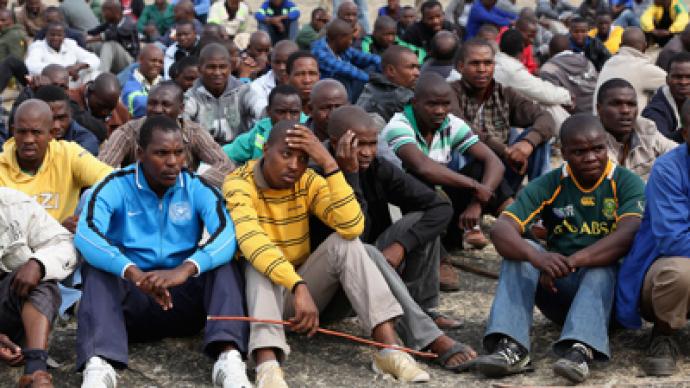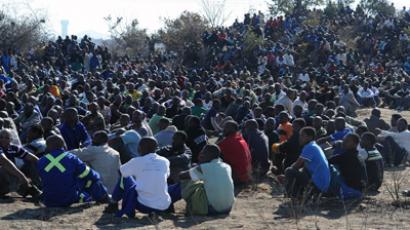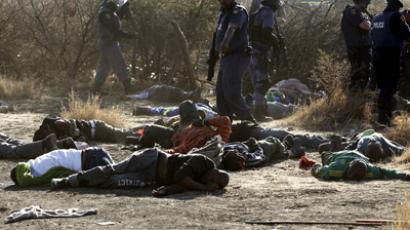Shocking autopsy: South African police 'shot fleeing protesters in the back'

South African police are facing accusations of mass murder after autopsies on the victims of a bloody crackdown at Marikana platinum mine, showed that miners were shot in the back. Meanwhile, new violence has broken out at the location.
Police claim they used weapons to defend themselves against a wave of strikers after first trying to quell them with tear gas and water cannons. Thirty-six people were killed during the standoff, only two of them policemen. The protesters, numbering in there thousands, were calling for pay rises.But post-mortem results of the victims suggest that the strikers posed no danger to the law enforcers at the time of the shooting.“The post-mortem reports indicate that most of the people were fleeing from the police when they got killed,” a police source told Johannesburg’s Star newspaper. “A lot of them were shot in the back and the bullets exited through their chests. Only a few people were found to be shot from the front.”Eyewitness reports previously indicated that a small group of protesters charged at the police barricade with machetes and clubs, fired a stolen police gun, and killed two officers before the uniformed men unleashed a deadly 3-minute hail of bullets.An official spokesman refused to confirm or deny the accusations on what’s already being dubbed the Marikana Massacre – the most violent episode in South Africa’s history since the 1994 fall of apartheid.But the Independent Police Investigative Directorate (IPID), a police watchdog, is investigating the miners’ deaths as murders.It also says that miners have launched dozens of complaints accusing the police of brutal treatment when they were arrested in the aftermath of the skirmish. Released mine workers say they were beaten with batons as officers tried to find out who was responsible for the initial attack on policemen.
Platinum problemThe Marikana mine, owned by London-based minerals giant Lonmin, continues to be gripped by violence, much of it between workers belonging to different unions.Two thousand striking miners wielding home-made weapons gathered on Monday at the site of the police shooting. They also sent teams to shaft entrances to deter strikebreakers from getting into work."There have been incidents of intimidation towards bus drivers overnight as well as intimidation of Eastern workers this morning, preventing them coming to work," said a Lonmin statement.A deepening three-sided conflict has dragged on throughout August, and has led to the deaths of another eight miners in other clashes. On the one side is Lonmin- the other two rival unions. The mainstream National Union of Mineworkers (NUM), which enjoys a working relationship with the authorities, has been in conflict with the Association of Mineworkers and Construction Union (AMCU), a more militant upstart.The AMCU has demanded that pay for miners, who operate rock drillers, be tripled from $500 to $1,500 a month. The NUM has encouraged its members to return to work.57 percent of workers signed in during the weekend, but the numbers dropped to only 13 percent on Monday.The festering crisis has weakened the position of embattled President Jacob Zuma. Local media attacked Zuma for failing to quell the crowd and take control of the situation in the hours following the August 16 shooting. The president previously said it was “too dark” to address the baying crowd.In December, Zuma faces an internal vote on whether he will lead his party, the ANC, into the next national election in 2014.














